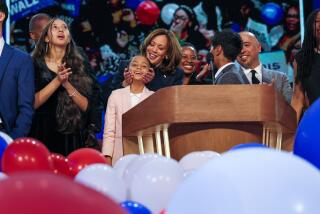Rich White Men Can’t Be Allowed to Hog the Political Process
- Share via
During the 1964 presidential election, Fannie Lou Hamer led a group of black Mississippians to the Democratic National Convention in Atlantic City. At the convention, she testified that the all-white Mississippi delegation did not fairly represent Mississippi’s people because she and other African Americans were prevented from voting through violence and discriminatory devices such as literacy tests. The national networks aired her testimony, and the next year President Johnson signed the Voting Rights Act.
Now that President Bush has signed federal campaign reform legislation that bans “soft money” contributions, the next step requires an embrace of the inclusive democratic values put forth by Hamer and full public financing of campaigns.
Hamer, who died in 1977, viewed participation as a right and sought to remove barriers to political participation by all Americans, regardless of race, gender and economic status. In contrast, most conventional campaign finance proposals, including the ban on soft money, aim to reduce the corrupting influence of individual wealthy interests over government.
Broadening the campaign reform movement to include Hamer’s democratic values would mean at least two things. First, the movement’s leadership and membership would expand to reflect the diversity of America. At present, suburban upper-middle-class good-government activists provide most of the support for conventional reform proposals. Second, an inclusive movement would promote reforms that make democracy more accessible for racial and ethnic minorities, women and the poor.
Even after soft money contributions are banned, campaign funding will be controlled by a narrow, homogenous group that will make “hard” money contributions of up to $2,000 per election. Studies of these contributors show that 80% are male, 81% have household incomes over $100,000 and more than 95% are white. This prosperous white and mostly male class determines which candidates can run credible campaigns. It also gives preferential access to politicians and to the leadership of political parties, greatly determining which issues will be at the forefront of the legislative agenda.
Public financing of elections would help end the monopoly that private money has had as an obstacle to participation. Some might say that government cannot afford to replace the $2.7 billion in private money contributed to candidates and parties in the last election cycle, but any tactic that can more squarely focus the attention of our federal officials on key community concerns such as racial profiling, health-care disparities, police brutality and education reform must be given a chance. Public financing of campaigns would promote advancements in improving the lives of the overwhelming majority of Americans who are not a part of the less than 7% of the population that funds federal elections. A more inclusive democracy would give everyone a sense of first-class citizenship and would avoid the frustration and disillusionment that flow from systems that rely primarily on private dollars.
“I’m sick and tired of being sick and tired,” Hamer proclaimed in explaining her activism. The future of campaign reform requires a bold vision that speaks to the concerns of the “sick and tired” and includes all Americans in our democracy.
More to Read
Get the L.A. Times Politics newsletter
Deeply reported insights into legislation, politics and policy from Sacramento, Washington and beyond. In your inbox twice per week.
You may occasionally receive promotional content from the Los Angeles Times.










